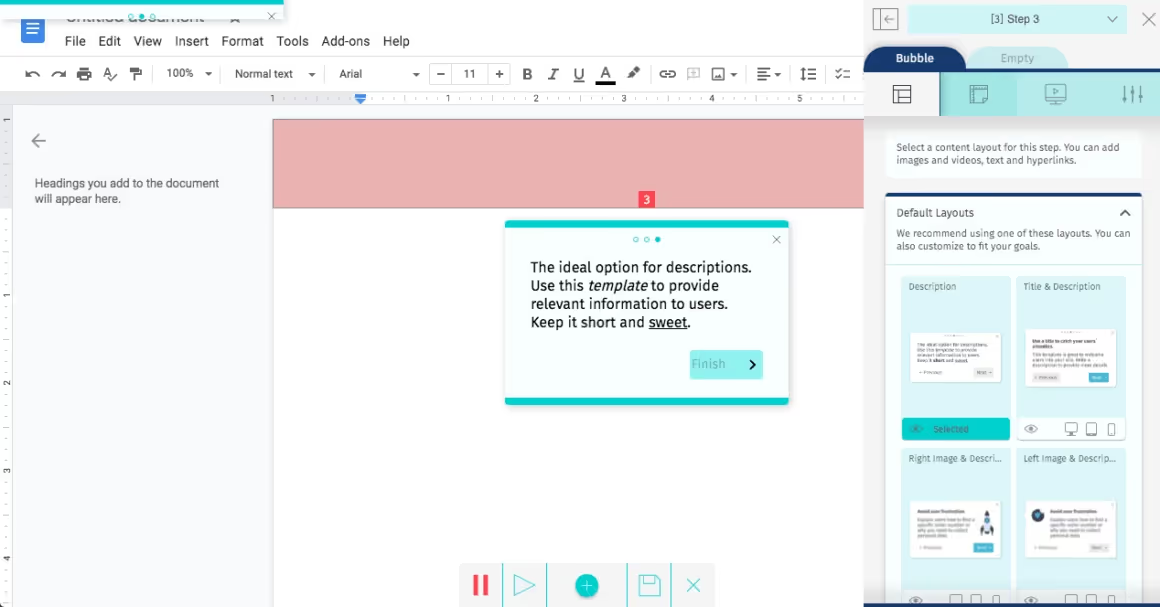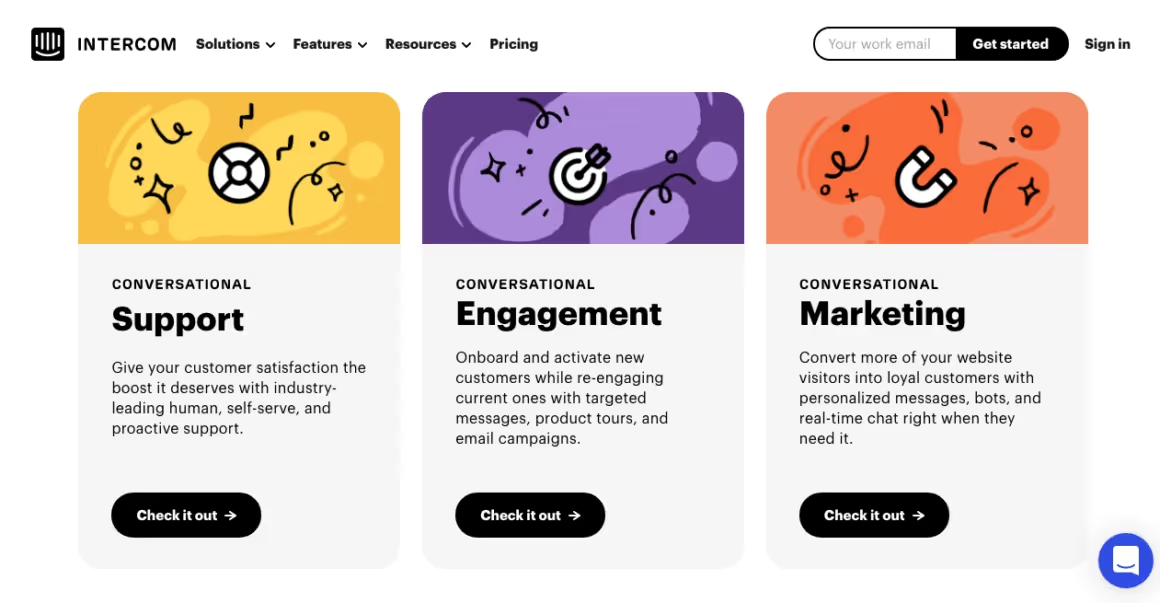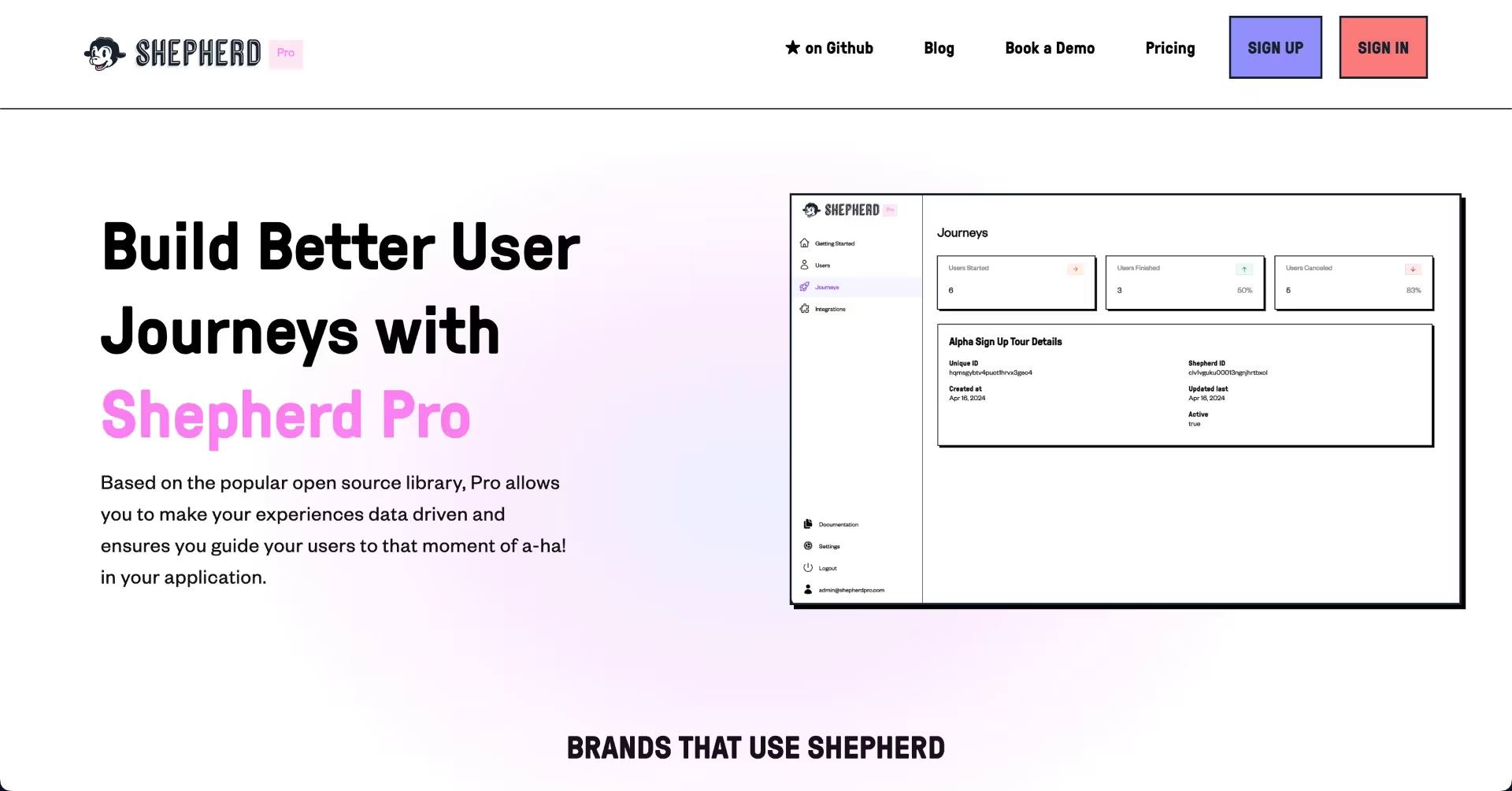

Helppier is a simple tool.
And its value lies in exactly that quality.
Helppier is your good ol' user onboarding software that uses interactive guides to help onboard your users. You can customize and use templates to create onboarding flows, and it is mostly no-code.
But it might not be the best option for everyone.
And if you're expecting a little more from such a tool, it's especially not the best option for you.
So, in this article, we will explore the best alternatives for Helppier.
What Helppier Does Well
In its own league, Helppier excels with a few qualities:
1- Simple enough for no-tech teams
Helppier's number one benefit is that it is no-code with a simple interface. Meaning that no matter the team or technical knowledge, most users can find value in the tool.
Its solutions also align with this simplicity mindset and focus on delivering one good product instead of a few bad ones.
What do I mean by that exactly? 👇
2- Adequate onboarding capabilities
Helppier isn't afraid to admit that it is a user onboarding tool and that user onboarding features are what it needs to excel at.
So, they offer features like interactive guides, tooltips, hotspots, tutorial videos, and other features that are directly related to a user onboarding use case. There is even mobile support for Android.
And for most of Helppier's user base, it works just fine.
Is the tool all perfect, though?
Drawbacks of Helppier
Now, while Helppier is a good enough option for some, it has many drawbacks for others, some of which are:
1- Complicated UI
Helppier offers its own dedicated template library, which is pretty useful for creating user onboarding flows.
But if you choose not to go with the templates and create something of your own, the user interface —and, naturally, the user experience—can get somewhat complicated.
This is because the Chrome extension instructions aren't very clear, and you need to figure that out before starting to create.

2- Very few features
Now, we mentioned Helppier's user onboarding features as a benefit, but apart from that, the Helppier feature stack isn't too comprehensive.
Using Helppier, you can create product tours, tooltips, hotspots, and NPS surveys. And that is practically most of what you can do with the tool.
For those looking for a tool that will help with the overall user experience inside their product, Helppier falls short.
3- Constant bugs and crashes
A common problem with Helppier is also that it sadly crashes a lot.
It is a bit buggy and takes too long to load the tool after an action, around 20 seconds. The mobile support also isn't too stable, and keeping in mind that its product adoption process is a bit steep, Helppier might be a difficult tool.
Now, if these drawbacks are red lines for you, do not worry.
Here are some solid alternatives to Helppier:
8 Best Helppier Alternatives
1- UserGuiding - all-around in-app experiences
- G2 Score: ⭐️ 4.7 (391 reviews)
- Capterra Score: ⭐️ 4.7 (51 reviews)
UserGuiding is a product adoption platform that aims to enhance the in-app experiences of products.

It is a tool that started off as a user onboarding solution and evolved into an all-around platform for user adoption, feedback collection, self-service help, and more.
UserGuiding is among DAP industry leaders with a customer base mostly made up of mid-market businesses due to its affordable but also scalable pricing.
UserGuiding Use Cases
UserGuiding is thoroughly equipped with features aimed at onboarding users, collecting feedback, and optimizing their in-app experience.
The main use cases include:
👉 Product & Feature Adoption
With the user onboarding features in UserGuiding's arsenal, like onboarding checklists, interactive walkthroughs, hotspots, tooltips, and announcement modals, users can get started with product adoption right away.
Moreover, customization and segmentation also support product and feature adoption, while powerful analytics support quick implementation.
👉 Self-Service Help & Knowledge Base
With resource centers and the latest addition to the self-serve set, knowledge base, UserGuiding is an adept tool for encouraging end users to self-serve.
Since checklists and guides can be added to resource centers and the knowledge base was designed to connect with other UX elements in-app, the use case comes all around.
👉 Surveys & In-App Feedback Collection
UserGuiding also offers in-app surveys and NPS surveys, which help collect customer feedback on your product.
The surveys are supported by their own analytics dashboard, giving users a broader look at what each piece of feedback means and how to move forward.
The product updates feature makes it easier to announce new updates and collect relevant feedback on a standalone page as well.
Pricing
UserGuiding has a 14-day free trial along with 3 pricing plans that change based onthe number of active users you have. When billed yearly:
- Starter Plan: Starting from $174/month.
- Growth Plan: Starting from $349/month.
- Enterprise Plan: Custom quote.
UserGuiding vs Helppier
Helppier and UserGuiding are fundamentally both digital adoption tools. But while the former holds its ground on user onboarding, UserGuiding has been sailing for more comprehensive experiences for a while now.
The most drastic difference between the two is the quality and quantity of their features. Where Helppier offers only user onboarding features, UserGuiding offers solutions for feedback collection and analysis, self-service help and user engagement.
UserGuiding is also more defined in terms of ease of use and ease of setup. There is also a significant disparity between the analytics capabilities of the tools, with UserGuiding offering more sophisticated analytics elements.
The main advantage Helppier has over UserGuiding is its pricing, starting at $49/month for 1000 MAU, while UserGuiding offers $174/month for 2000 MAU.
But with the MAU ranges considered, UserGuiding still proves more advantageous for bigger operations.
2- Whatfix - better for personalization
- G2 Score: ⭐️ 4.6 (337 reviews)
- Capterra Score: ⭐️ 4.6 (77 reviews)
Whatfix is another digital adoption platform that is a top choice when it comes to employee onboarding and training. It has a big set of features and robust analytics.

The pricing for Whatfix is a lot higher than that of Helppier. However, it is worth mentioning as an alternative if you're willing to pay according to its many capabilities.
Whatfix Use Cases
Whatfix offers 3 main use cases as a digital adoption tool:
👉 Onboarding and employee training
Whatfix has features such as interactive guides, self-help menus, and task lists.
While these are mainly better suited for employee training, they can also be used for user onboarding as well.
👉 User engagement
Whatfix offers features like in-app messaging and Self Help widgets for its user engagement use case.
These features come in handy not only for higher user engagement but also for customer support as well as user support in the context of employee training.
👉 Analytics & tracking
And for the last use case, Whatfix offers not only analytics for its UX elements but product analytics as well. The feature is backed with reports and tracking capabilities.
Pricing
Whatfix does not offer public pricing, but we can say that it is much higher than Helppier's pricing, competing but falling shortly behind the likes of WalkMe and Pendo.
Whatfix vs Helppier
Much like some other tools among our alternatives, Whatfix is a more evolved tool overall than Helppier.
Especially when it comes to analytics capabilities, Whatfix, with its product analytics, takes the lead as well. And though more suitable for employee onboarding, Whatfix's user onboarding capabilities are still more effective than Helppier's.
Helppier is naturally way more affordable than Whatfix. However, when features and capabilities are compared, unless you are on a budget, Whatfix can still be a valid alternative.
3- Pendo - powerful analytics option
- G2 Score: ⭐️ 4.4 (1422 reviews)
- Capterra Score: ⭐️ 4.5 (215 reviews)
Pendo is one of the top digital adoption platforms and a leader among the tools in this category.

The tool is known for its robust analytics since Pendo evolved from a user engagement platform into an all-in-one digital experience tool.
Pendo is also known for its enormous set of features and steep pricing to match with the range of features, but with the right budget, it is a great alternative.
Pendo Use Cases
👉 Product analytics
Pendo's most important use case, as we've mentioned above, is its product analytics, which lets users check when, where, and how their product is being used.
It offers good visualization options along with a good set of report types and heatmaps. In this sense, Pendo goes above and beyond what Helppier offers, since Helppier's analytics are very limited.
👉 User onboarding and employee training
Pendo also offers a streamlined onboarding process with its guided tours and in-app tutorial features.
The features are effective as a user onboarding solution as well as employee training. While Helppier offers more onboarding features, Pendo is more powerful for employee onboarding.
👉 Feedback Collection and Management
Lastly, Pendo also makes user feedback collection easier with customizable in-app surveys and NPS tracking.
Though Helppier also offers NPS, Pendo is ahead for this use case thanks to its survey feature.
Pricing
Though Pendo has a free version, it barely does any good for any business looking to scale its operations. There is also no public pricing; however, Pendo is known in the market as one of the priciest solutions in DAP.
Pendo vs Helppier
The main difference between Pendo and Helppier is not only the wide set of features Pendo offers but also the tool's general usability.
While Pendo is an advanced, well-developed tool, Helppier often comes off as a less sophisticated solution.
Helppier has a more direct and focused use case, while Pendo tries to offer a whole solution for all use cases relevant to digital experiences. In this way, Helppier might be more straightforward, especially if you're unwilling to pay for features you might not need.
In terms of pricing, the rift is almost too big. While Helppier starts at $49/month, for Pendo, the starting price is up to several thousand.
If you need to completely transform everything about your digital experiences and you have the budget for it, Pendo might be the right alternative for you.
4- Intercom Product Tours - better for customer support integrations
Intercom Product Tours is an add-on feature of the popular customer service solution, Intercom.

While it is actually a feature, Intercom Product Tours operates on the same level as some standalone tools in DAP, with a big set of capabilities.
The only reminder would be that Intercom Product Tours needs to be purchased after purchasing an Intercom plan first, since it's an add-on.
Intercom Product Tours Use Cases
Intercom Product Tours comes with a good package of use cases.
👉 Customizable tours & in-app messaging
With Intercom Product Tours, you can create interactive tours tailored to user segments and send contextual messages to users within your product.
Though the tours aren't as advanced as Helppier's or some others on the list, like UserGuiding, it is a good alternative for Intercom users.
👉 Data Analytics
Intercom already offers pretty good analytics features, and Intercom Product Tours isn't excluded from the analytics stack.
The feature has metrics to track user engagement and the effectiveness of tours.
👉 Integration
Maybe the best part for existing Intercom users is the integration with the Intercom features and the Intercom integrations list, which definitely is not too big in Helppier's case.
Pricing
Intercom Product Tours, as we've mentioned above, is an add-on. If you're going to use it, you will need to purchase Intercom, which starts at $39 per seat/month.
After that, Prdocut Tours is listed for $99/month, but since Intercom does its pricing according to need, this price can go up or down.
Intercom Product Tours vs Helppier
Helppier and Intercom Product Tours have pretty similar capabilities; in terms of ease of use, Intercom has the lead, while no-code gives Helppier the edge.
They are also pretty similar when it comes to features; however, Intercom's integrations and analytics capabilities push Product Tours forward.
Lastly, in terms of pricing, unless you are an existing Intercom user, going for Intercom Product Tours over Helppier might not be worth the hassle or the money.
This is especially so if you don't need Intercom to begin with.
5- Gainsight PX - better for customer success use cases
- G2 Score: ⭐️ 4.4 (223 reviews)
- Capterra Score: ⭐️ 4.0 (7 reviews)
Gainsight PX is a product experience platform designed to help businesses understand, engage, and guide users throughout their journey.

It is a good alternative to Helppier if you've come to realize that what you expect from Helppier is actually beyond user onboarding and more PX.
Gainsight PX is known for its analytics capabilities and user engagement features.
Gainsight PX Use Cases
👉 User analytics and insights
Gainsight PX provides detailed analytics to track user interactions and identify usage patterns.
This helps understand how users engage with the product, which can inform decisions on feature development and optimization.
Since Helppier's analytics is not too sophisticated, this is an important difference between the tools.
👉 Personalized onboarding
Through in-app guides, tooltips, and walkthroughs, Gainsight PX creates personalized onboarding experiences.
This enhances user retention by providing users with the information they need when they need it. Helppier also offers personalization to a degree, but Gainsight PX still offers more options objectively.
👉 In-app messaging and targeting
Gainsight PX delivers targeted in-app messages and announcements, promoting new features or updates.
It also uses behavioral targeting to send specific messages based on user behavior. While Helppier also does in-app messaging, its behavioral targeting capabilities are slightly more limited.
Pricing
Gainsight offers a free trial for its PX solution, but the pricing isn't publicly shared.
Gainsight PX vs Helppier
Gainsight PX and Helppier both offer robust capabilities for enhancing user experience, but they cater to different needs.
Gainsight PX excels in detailed analytics and user segmentation. Meanwhile, Helppier’s no-code interface makes it more accessible to non-technical users who need quick setup and user guide management.
Gainsight PX stands out with advanced in-app messaging, behavioral targeting, and A/B testing. While Helppier is strong in customization and onboarding, it focuses on simplicity and ease of implementation. This makes it more suitable for smaller teams or those without dedicated development resources.
In terms of pricing, Gainsight PX is better for larger enterprises with the budget for its extensive features. Helppier offers a cost-effective solution for businesses seeking a comprehensive yet easy-to-use tool for user onboarding.
6- WalkMe - enterprise-level solution with more features
- G2 Score: ⭐️ 4.5 (415 reviews)
- Capterra Score: ⭐️ 4.4 (62 reviews)
WalkMe is yet another leader in the digital adoption space, offering advanced solutions for enterprise-level businesses.

The tool is a well-designed, refined solution that is especially preferable for employee training and onboarding tasks in bigger companies.
The capabilities are pretty exclusive, but we know that it functions pretty similar to Pendo.
We can even call it the Pendo of employee onboarding.
WalkMe Use Cases
For WalkMe, we can list 3 key use cases:
👉 Onboarding and employee training
Using its features like interactive guides and in-app assistance, WalkMe offers onboarding capabilities that are best suited for employee training as well as user onboarding.
The personalized training experiences WalkMe offers are especially important for creating an effective onboarding process. Helppier competes with this with its high customization options.
👉 Product and feature adoption
WalkMe's interactive walkthroughs and tooltip features are especially handy when getting users to adopt a new feature, as well as for product adoption.
These features serve to support product adoption for employees as well, with UX elements customizable for employee product adoption.
Though Helppier doesn't have an employee onboarding use case, its onboarding tools can be used similarly to how WalkMe uses its own.
👉 Customer Support and Self-Service
WalkMe also boasts a support use case with self-serve options, which reduces support needs to an extent since, with in-app guidance, users get to self-help.
Pricing
WalkMe does not have a free trial or public pricing, but being among DAP leaders, it is known as one of the most expensive products for onboarding.
The tool's annual contracts very often exceed $10,000, according to users, and for enterprises, the price is even steeper.
WalkMe vs Helppier
In terms of ease of use, WalkMe has a very steep learning curve along with hard implementation, while Helppier is known for being easy to master. WalkMe also requires somewhat comprehensive technical knowledge.
When it comes to features, it is indisputable that WalkMe has a bigger stack of features for different use cases and more advanced ones, too. Helppier, as we've mentioned several times by now, is a pretty straightforward product.
Pricing-wise, the difference is even bigger than that of Pendo and Helppier. We can say that Helppier is for smaller companies while WalkMe is exclusively for enterprises.
WalkMe becomes a good alternative to Helppier only when you need to be training employees on an enterprise scale, with enterprise budgeting.
7- Shepherd.js - open-source, best for developers
Shepherd.js, now also known as Shepherd Pro, is an open-source library that offers simple onboarding guides and onboarding elements.

With the Shepherd Pro's launch, the library is now a tool that offers analytics capabilities and integrations along with its original value prop.
The original library is still available and free, but the Pro version also offers a free version.
Shepherd.js Use Cases
Though the library is now a full-on tool, what it offers remains the same: user onboarding.
Shepherd Pro comes with an analytics feature that gives insights into the user flows you create. It also allows for better customization since it's essentially a library you need to code with.
With the Pro, it has also become easier to add elements to your product using Angular, React, Vue.js, Ember, ES Modules, or Javascript.
Pricing
There are two plans for Shepherd Pro, while the original library is free.
- Alpha: Free, unlimited features and integrations
- Enterprise: Custom pricing, with white-glove service
Shepherd.js vs Helppier
The most apparent difference between Shepherd and Helppier is that Helppier is a well-developed tool while Shepherd Pro is still basically a better-organized library.
Among our alternatives, Shepherd is one of few that is more primitive than Helppier.
Helppier also offers more features and does not require coding, while Shepherd is practically a coding guidebook.
Shepherd has the upper hand when it comes to how customizable it is, thanks to its library nature, while Helppier falls short.
Shepherd is also more affordable for a product of its size, but getting Helppier might still be more advantageous unless you know how to code and have the time.
8- Pageguide - free open-source option
If you want to go even more basic than Shepherd, Pageguide is the address.

Pageguide, as the name suggests, is a very simple solution focused on page-guiding users. In doing so, it offers a free open-source library that is primarily supported and maintained by its community.
Pageguide Use Cases
Pageguide only offers page guides, which are basically guides for simple one-page websites.
This use case, though not as fully-fledged as Helppier, can be suitable for coding quickly for a small project without the burdens of subscription.
Pricing
Pageguide is completely free to use.
Pageguide vs Helppier
There are many differences between Helppier and Pageguide, first of all being that one is a platform while the other is a code library.
PageGuide is a free, open-source library that requires technical knowledge for implementation and customization. Helppier, on the other hand, is a subscription-based service designed for non-technical users.
Helppier is a user-friendly, no-code interface with a good set of features and robust analytics, while Pageguide lacks all of those.
The best thing about Pageguide is the fact that it is much easier to customize it since it requires coding.
So, we could say that PageGuide is best suited for technically skilled teams seeking a customizable and budget-friendly option. Helppier offers a more polished, feature-rich platform suitable for businesses looking for a hassle-free, comprehensive user onboarding tool.
Wrapping Up
When exploring alternatives to Helppier, it's important to consider each platform's unique strengths to find the best fit for your needs.
UserGuiding offers user-friendly, no-code tools for comprehensive onboarding and feedback collection. Whatfix excels in personalization and analytics, ideal for advanced capabilities and detailed insights.
Pendo provides robust analytics and extensive features for those willing to invest more. Intercom Product Tours is great for existing Intercom users needing seamless integration with customer support tools.
Gainsight PX offers advanced user analytics and segmentation, perfect for customer success teams. WalkMe is suited for large-scale employee training and product adoption, though it's pricier.
For developers, Shepherd.js and Pageguide are cost-effective, open-source options for customizable user onboarding. Choosing the right platform depends on your specific requirements, budget, and the complexity of your digital adoption strategy.
Good luck in advance 🍀
Frequently Asked Questions
Who should use Helppier?
Product owners, growth managers, customer success, and product managers can use Helppier and its alternatives, such as UserGuiding, to effectively onboard new users.
How much does Helppier cost?
Helppier has a 14-day free trial period. After that, the amount you pay starts from $49/month for 1.000 MAU, and changes according to your MAU rates. For a tailor-made price, contact their sales team.
What are the top alternatives to Helppier?
The top alternatives to Helppier are UserGuiding, Whatfix, Pendo, Intercom Product Tours, Gainsight PX, WalkMe, Shepherd.js, and Pageguide.















.svg)
.svg)
.svg)
.svg)
.svg)











.svg)
.svg)




.png)
















